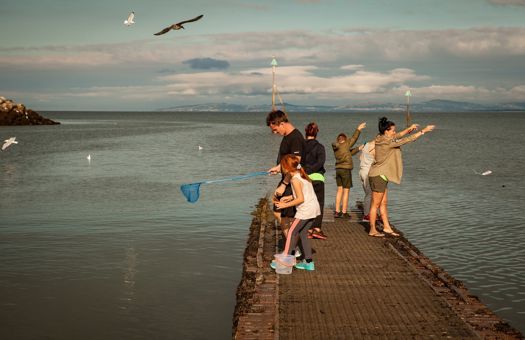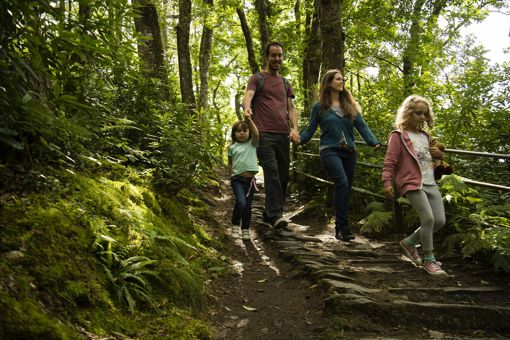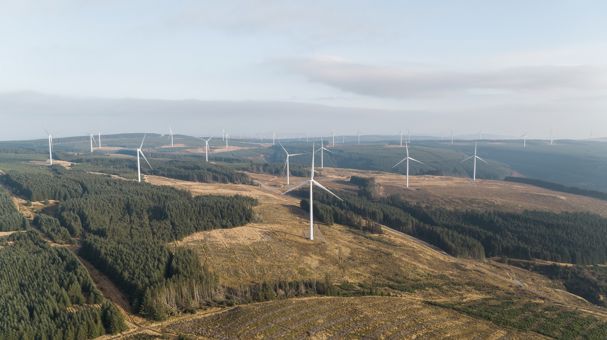SoNaRR2020: Beyond sustainability
The SoNaRR2020 chapters identify actions that can help Wales achieve the sustainable management of natural resources (SMNR) and bridge the gap between where Wales is today and where we need to be to meet the well-being goals.
The actions focus on ecosystems and economic activity. Specifically, physical management of natural resources in the eight broad ecosystems.
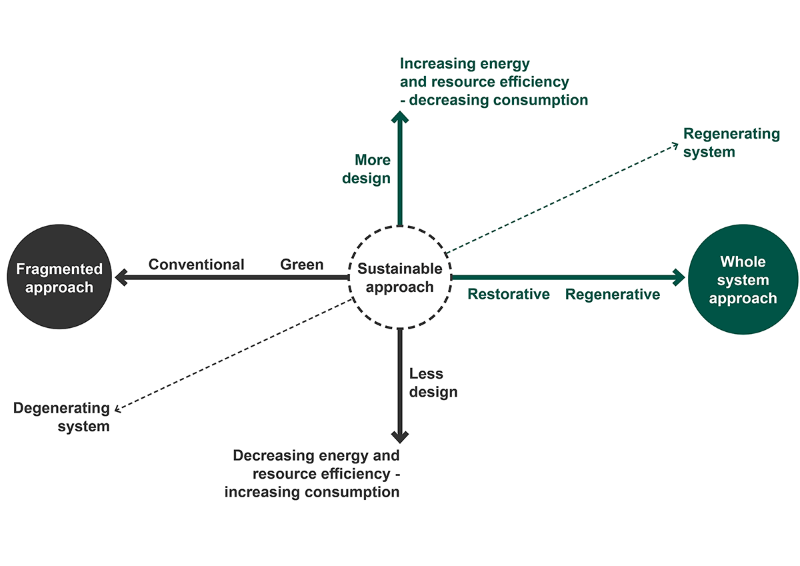
Figure 1: Figure compares the characteristics of a regenerating and a degenerating economy. It emphasises that a degenerating economy of mechanistic design uses more energy and materials, while a regenerating economy of natural system design uses less energy and materials.
Traditionally, action to address environmental pressures has focused on influencing the management of the broad ecosystems, using incentives and regulation to influence the use of natural resources and functioning of ecosystems.
There has been a focus on the ecosystem sphere, with direct management of land and sea, and the economic sphere, involving the regulation of economic activity. Responding to the nature and climate emergencies needs to offer something more than this traditional approach.
As the Convention on Biological Diversity (CBD) graph below shows, the actions to address issues such as the loss of biodiversity, need a range of approaches, taking an ecosystem, economic, social and cultural focus.
Working up from the bottom of the graph, Wales needs to use everything from action for nature conservation to reducing its consumption of natural resources.
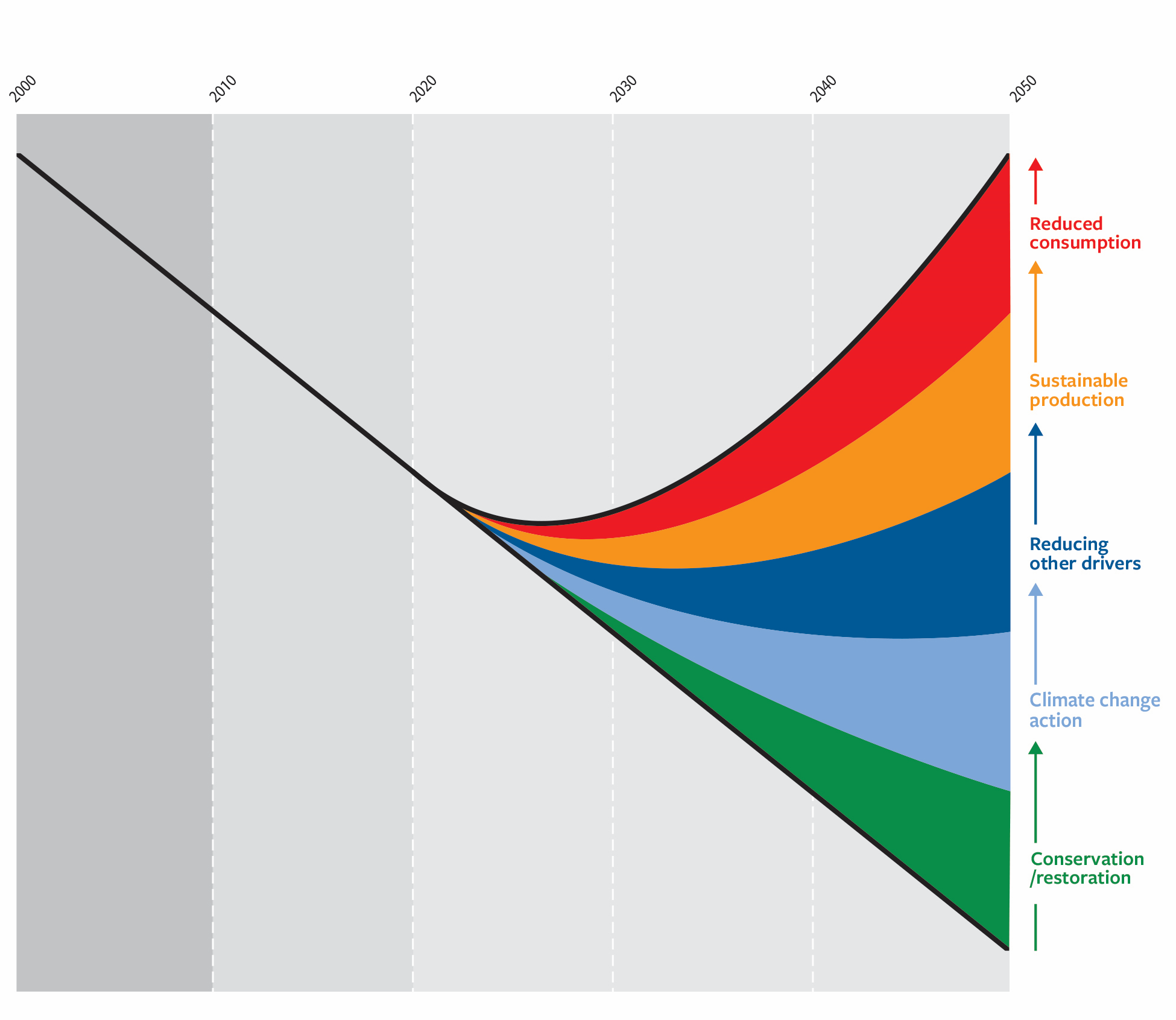
A portfolio of actions to reduce loss and restore biodiversity - adapted from CBD 2020
© Secretariat of the Convention on Biological Diversity.
(Global Biodiversity Outlook 5 – Summary for Policy Makers)
Adding in the social sphere
By adding a focus on the social sphere and how we leverage change in society, we can enable an appropriate response to the global environmental issues Wales faces.
Achieving the sustainable management of natural resources is not something which NRW or the Welsh Government can do alone, it is a challenge for the whole of society.
NRW are exploring how the public sector can foster collaborative action with business and civil society. Through Area Statements and Public Service Boards, we are exploring how to best implement the Welsh Government Natural Resources Policy.
To deliver transformative change Wales needs to trial ideas, launch experiments and support innovation. It is only by working across the public, private and third sectors that the ecosystem, economic and social spheres can be used to leverage the change needed to address the nature and climate emergencies.
To deliver change beyond what the public and private sectors have been doing with land management in the ecosystem sphere and regulation in the economic sphere, we need to engage civil society and bring in the social sphere.
Civil society contains a wide array of non-governmental and not for profit organisations, such as voluntary and community organisations, faith groups, trade unions, local and national charities. This range of actors offers a variety of opportunities for delivering change at different scales.
Taking a whole systems approach, means looking at the role business and the voluntary sector can play, together with government, at the local, Wales and UK levels.
“People are responsible for today’s major environmental problems: deforestation, overfishing, ocean plastics, and, of course, climate change. But people are also the solution. Our growing understanding of human behaviour and decision-making holds tremendous promise for inspiring the behaviour change necessary to conserve nature and provide for the communities who depend on it.”
- Behaviour Change for Nature A Behavioural Science Toolkit for Practitioners.
Environmental problems have traditionally been addressed at the level of the direct drivers of change, taking the pressures as they appear on the ground, in the ecosystem sphere. For example, solutions to diffuse water pollution from agriculture are sought at the farm scale, with different land management and improved storage of potential pollutants. But taking action at this level cannot change the systems and the behaviours driving the pressures on the environment.
The indirect drivers of pollution within the food system, such as the demand for cheap food and farm incomes squeezed by the retail sector are not addressed by action within the ecosystem sphere. The solution is to transform the food system at a high enough level to design out the pressures at source.
System changes within the social sphere can deliver a wider range of actions focusing on the indirect drivers and changing the way people in Wales live. Including a focus on society in addition to the economic and social spheres, provides a further space to leverage change to the indirect drivers, expanding the focus to include economic, demographic, governance, technological and cultural elements.
Ecosystem, economic and social spheres:
- The ecosystem sphere, which looks at direct opportunities to manage natural resources more sustainably
- The economic sphere, where incentives and regulation can address the indirect drivers of change and reduce the pressures on ecosystems
- The social sphere, where changes to the way we live can make more radical impacts, focusing on the indirect drivers and reducing pressures, addressing drivers of environmental change at source
Options for change in the ecosystem sphere are constrained by the limit to which ecosystems can be modified while retaining their resilience. There is only so much that can be done to change land management on farms to limit diffuse water pollution.
By contrast, there are many more options available to steer the economic sphere in a more sustainable direction. Changing the operating environment the farm is working in, will present more options for land management and less intensive farming systems. But, the options will still be constrained by both the food that consumers are seeking and the price they are prepared to pay.
By far the largest space for change is to be found in the social sphere around the options to change the way people in Wales live. Changing the way society organises the food system will drive change throughout the system.
Looking beyond the regulation of the food system, at the wider public policy outcomes, it has been estimated that for every £1 consumers spend on food, another £1 of costs are borne by society in terms of health impact and water pollution (Fitzpatrick I, Young R, Perry M, Rose E. 2017). It is clear that Wales needs to leverage change across all three spheres, taking the relevant opportunities at different levels to make progress towards the well-being goals.
Read next
SoNaRR2020: Transforming Wales
SoNaRR2020: Transforming the food system
SoNaRR2020: Transforming the energy system
SoNaRR2020: Transforming the transport system

